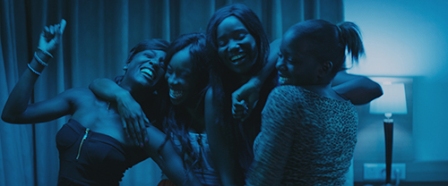Maven's Nest
Reel Life: Flick Pix

Deep inside a posse of Afro-French teenagers
By Nora Lee Mandel
GIRLHOOD
Written and Directed by Céline Sciamma
Produced by Bénédicte Couvreur
Released by Strand Releasing (available on DVD)
France. 113 min. Not Rated
In French with English subtitles
With Karidja Touré, Assa Sylla, Lindsay Karamoh, Marietou Touré, Idrissa Diabate, Simina Soumare, Cyril Mendy and Djibril Gueye
Girlhood opens like many movies about All-American high schools – with an exciting football game. But when the helmets come off as the winners and losers congratulate each other – surprise – they’re girls, they’re black, and they’re French, the daughters of African immigrants living in the dense outskirts of Paris, the notorious banlieues. But from that exhilaration of teamwork and achievement, sixteen-year-old Marieme (Kardija Touré) has to run a gauntlet of stresses, through her school, in the neighborhood, and back at home. How she cannily chooses to deal with those pressures unfolds in chapters, each marked with electronic music, marking how Marieme changes social groups and identities, though not always convincing and sometimes relying on what seems like stereotypes to the American eye.
At home, Marieme bristles with resentments, of threading by mocking guys, of having to take care of her 12-year-old sister because her mother works long hours, and, most of all, against how their older brother, Djibril, physically enforces his rule over them. The sexism is portrayed as much traditional African family values as her long braids.
Back at school, she resents that a guidance counselor wants to transfer her into vocational school, with a universal adolescent plea: “I want to be normal!” She rebelliously calculates that “normal” means joining up with a tight, taunting trio who first test her with a challenge to come to Paris. An aggressive posse of chattering, stylish teenage girls on the subway and into a shopping center with apprehensive white “shop slaves”, as they sneeringly call them, is a familiar urban sight, but writer/director Celine Sciamma, in what she sees as the close of her trilogy of female coming-of-age and gender/sexual identity films, after Water Lilies (Naissance Des Pieuvres) and Tomboy (and my additional note), zooms into their point-of-view as a more proud, empowering female friendship than peer conformity. (The original title translates as “Gang of Girls”.) Flashing a new phone and a knife, Marieme copies their short, dyed, straightened hair styles and welcomes a new, European nickname of “Vic”, for Victoria, like the two alpha girls call themselves “Lady” (Assa Sylla) and “Filly” (Marietou Touré).
Even as they reject their single immigrant mothers in their drudge jobs like hotel cleaner, that hotel access helps them snag rooms on a regular basis, for their own grown-up space to be free in the city, with exaggerated femininity of shoplifted lingerie, pizza, snacks, a bubble bath, and racy movies. These are the most entertaining scenes in the film, as they, Glee-like, act out music videos, particularly an extended dance to Rihanna’s “Diamonds”, as they joyously preen to the chorus “Tonight/You and I/We’re beautiful/Like diamonds in the sky”. By the next, jarring, chapter, “Vic” is getting more and more aggressive, sexually with her new, handsome boyfriend, and starts standing up to her brother.
Up to here in the film, with urgent, fast-moving cinematography and intense close-ups (that the expressionless nonprofessionals don’t quite justify), and percussive soundtrack, Sciamma updates images of youth in these desolate places that hasn’t been seen much in the decade since the likes of Abdellatif Kechiche’s Games of Love and Chance (L'Esquive) (2003), Benoît Jacquot’s À Tout de Suite (Right Now) (2004), and Ziad Doueiri’s Lila Says (Lila dit ça) (2004), which each focused more on an alluring blonde than girls of color. (JR’s Les Boquets, an in situ music/dance short that premiered at the 2015 Tribeca Film Festival, uses primarily male neighborhood images.)
Taking sharp turns, the concluding chapters defiantly support the surprising choices “Vic” makes next. At the darker looking next chapter, “Vic” has evidently dropped out of school and is hanging out more with a different, more dangerous group of girls on the street, since “Lady” has been jerked back to a real life working alongside her dour mother. Vic” now has the confidence to think she can hold her own with the boss, a pimp and drug dealer. Enjoying the money, then she seems to be running a successful call girl operation. But, too ironically and with only the previous hint of that opening exultation in football, the way “Vic” finds to assert control of her life and sexuality is to reject the camaraderie and femininity of girlhood altogether. This feels like a scripted story-line that’s more imposed on the character than grows out of her own feelings, and is made to look like a victory rather than a cautionary tale of the limits of being a young black female in France today.
.
2/11/2015
Nora Lee Mandel is a member of New York Film Critics Online and the Alliance of Women Film Journalists. Her reviews are counted in the Rotten Tomatoes TomatoMeter:
 Complete Index to Nora Lee Mandel's Movie Reviews
Complete Index to Nora Lee Mandel's Movie Reviews
Since August 2006, edited versions of many of my reviews of documentaries/indie/foreign films are at Film-Forward; since 2012, festival overviews at FilmFestivalTraveler; and, since 2016, coverage of women-made films at FF2 Media. Shorter versions of my older reviews are at IMDb's comments, where non-English-language films are listed by their native titles.
To the Mandel Maven's Nest Reel Life: Flick Pix
Copyright © 2018


